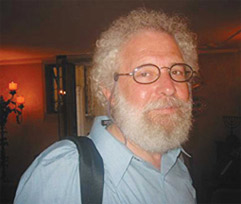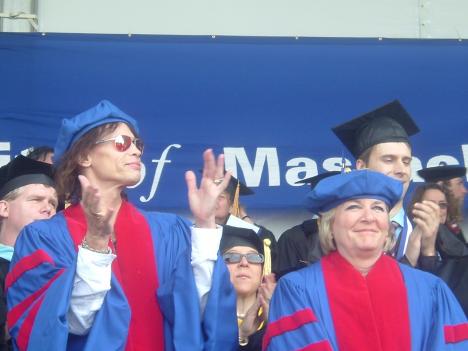Dr. Goldstein (Or How I Learned to Start Worrying and Hate the Bomb)

Professor Gary Goldstein a noted Tufts physicist gave a talk on the Mayors for Peace and their efforts to reduce the threat of nuclear weapons.
April 21, 2005
BY JOE BUCKLEYContributing Writer
For many years the masthead of the Bulletin of the Atomic Scientist magazine featured the doomsday clock symbol. It depicted a timepiece in the form of a globe that was, according to the current world situation, a few moments away from midnight/Armageddon. The purpose of this icon was to remind the public of the danger of nuclear war. That threat still exists albeit with less public attention.
On April 13 the UMass Boston Politics Society in conjunction with the Massachusetts Peace Action presented a film on the Mayors for Peace and their efforts to reduce the threat of nuclear weapons along with a talk by Professor Gary Goldstein, a noted Tufts physicist. The event was held at the Campus Center.
The film provided information and moving images on the horrible effects of nuclear explosions and their aftermath, and it outlined the Mayors for Peace campaign to ban nuclear weapons. The effort brings mayors from all over the world in contact with the international community to add real teeth to the Nuclear Non-Proliferation Treaty at the 2005 review process.
In his talk, Goldstein compared the press coverage of the Tsunami with the situation in Falujah, Iraq, where a populace equivalent to the combined populations of Cambridge, Somerville and Medford were driven from their homes and consigned to jury-rigged shelters because of the American assault on their city. He said one was a terrible national disaster which received wide attention while the other was an unnatural disaster which was for the most part, ignored by the media. The talk then moved on to the nuclear threat, which the speaker said is also ignored.
Goldstein said that Russia and the United states have more than 20,000 nuclear weapons. While the United States threatens other nations with punitive actions for engaging in nuclear weapon development, the Bush Administration is engaging in a the development of new nuclear weapons and plans to refurbish the stockpile of existing weapons. He continued to say that this global double standard is unsustainable and only increases the problem of nuclear proliferation.
Goldstein went on to describe the development of mini-nukes, bunker buster missiles, and the “robust nuclear earth penetrator.” He explained how these new instruments of “terminal radioactive violence” would add billions of dollars to an already bloated military budget. He noted that one Trident submarine carried enough nuclear firepower to destroy the entire Northern Hemisphere. He questioned the need for such a “symbol of threat and intimidation” with the current world situation.
Goldstein went on to say that Iran and North Korea’s nuclear programs are miniscule when compared to the American and Russian nuclear arsenals. The professor likened America’s nuclear arsenal as “the elephant in the room that never gets noticed…” America’s lax attitude towards nuclear disarmament has been used by India and Pakistan as the excuse for their nuclear weapons acquisition.
According to Goldstein the ABM treaty was thrown out in order for the military to engage in the development of a 180 billion dollar anti-ballistic missile defense system that to this date has been a notable failure. He also noted that Canada refused to take part in this program because it is the first step towards the militarization of space.
The professor’s talk was followed by a discussion period. Then a representative of Massachusetts Peace Action outlined a list of actions that concerned people could take to reduce the threat from weapons of mass destruction. The audience was urged to write to their representatives and senators to demand a fundamental change in U. S. foreign policy. The audience was also asked to call their mayors or town council members and ask them to join the Mayors for Peace initiative.
The talk was well received by a highly attentive audience. UMass Boston student Michael Shivley said, “there was a lot of information that is not making its way to the media and the public. If we can correct this, if we can allow this knowledge to circulate, then maybe large differences can actually take place.”
Reiko, a UMass Boston student whose home is near Hiroshima said, “Today’s talk definitely tells us how many nukes each country has does not matter. We have to know that there is always a nuclear possibility to be a murderer or a victim as long as we have nukes, even one. We should think this issue more as a reality by connecting our thoughts to Hiroshima and Nagasaki.”





















































